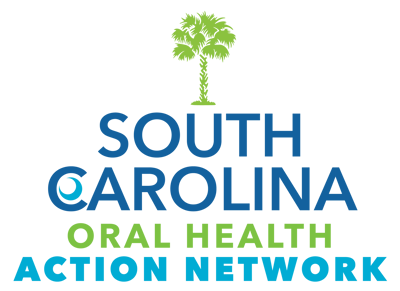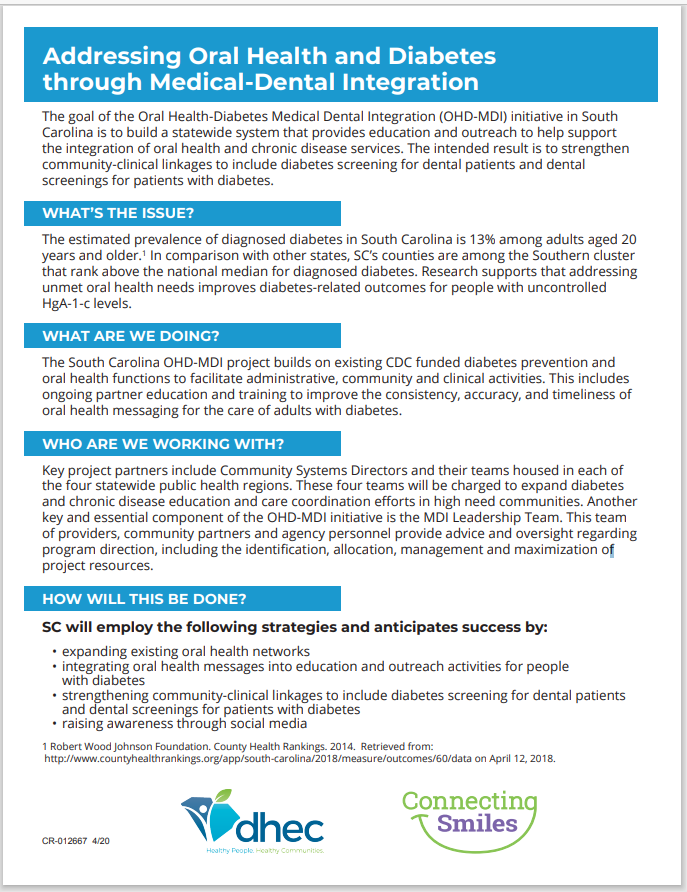Medical Dental Integration
The Connecting Smiles Hub is dedicated to providing oral health resources to frontline staff and community partners, to promote outreach, education, and training to support preventive oral health for vulnerable populations. Given the importance of oral health throughout the lifespan, from perinatal to geriatric stages, such initiatives are critical in ensuring optimal oral health outcomes for all individuals in South Carolina. By fostering collaborative relationships that reach citizens across the state, Connecting Smiles seeks to empower South Carolinians, particularly pregnant women and families with young children, to achieve better oral health.
The Oral Health Medical Dental Integration (OH-MDI) initiative in South Carolina is designed to establish a comprehensive statewide system that facilitates the seamless integration of oral health and chronic disease services. This project is aimed at enhancing individual and population health by bridging the gap between medical and dental care. OH-MDI is focused on educating and training partners, ensuring that oral health messaging is consistent, accurate, and timely within primary care settings for adults with diabetes.
The initiative’s objective is to improve overall health outcomes by promoting oral health as an essential component of chronic disease prevention and management. Through education and training, OH-MDI seeks to empower partners to raise awareness about the importance of oral health and promote healthy oral hygiene habits. In doing so, the initiative aims to establish an integrated system that will improve access to oral health services and enhance the quality of care provided to individuals with chronic diseases, such as diabetes.
The OH-MDI project’s approach is multifaceted and involves several components. It includes the development of educational materials, training programs, and protocols to ensure consistent messaging and practices across primary care and dental settings. Additionally, the initiative seeks to establish partnerships among healthcare providers, public health agencies, and community-based organizations to create a network of support for individuals with chronic diseases and their families.
Overall, the OH-MDI initiative in South Carolina represents a valuable effort to improve health outcomes by integrating oral health and chronic disease services. By fostering partnerships and promoting best practices, OH-MDI aims to create a comprehensive and sustainable system that will benefit individuals and communities throughout the state.
Why should medical providers access early oral health?
- The medical setting is the perfect place to promote and support early oral health.
- It is recommended that young children are seen by a dentist by age 1 and medical providers can reinforce that message.
- Medical providers can support early intervention and prevention during well-child visits that take place before the age 1 dental visit.
- Medical providers are natural advocates for child health and understand that oral health is a part of a child’s overall health.
Oral Health and Your Diabetes…Make the Connection
Did you know?
Poor oral health is often referred to as “the 6th complication of diabetes.” If you have been diagnosed with diabetes, your risk of developing gum disease increases, and if you are diagnosed with gum disease your risk of developing or negatively impacting your diabetes increases.
Chronic inflammation of the gums can cause damage to the cells responsible for insulin production. Diabetes affects your body’s ability to utilize glucose or blood sugar for energy and it reduces the body’s ability to fight against bacteria and gum disease.
Neglecting your oral health can lead to plaque and gingivitis and may eventually lead to periodontal disease. Persons with diabetes experience both gingivitis and periodontitis at three times the rate of those without the disease.
What can you do to protect your oral health and control the impact on your diabetes?
- Visit your dentist regularly and share information about your diabetes.
- Brush teeth with a fluoride toothpaste twice a day.
- Floss or clean between teeth daily.
- Eat a healthy, balanced diet.
- Limit foods and drinks that are high in sugar.
- Protect teeth from decay by drinking water with fluoride.
- Ask dental and medical providers to coordinate care by sharing test results.
Other Resources
Oral Health and Opioids
Did you know?
- In 2021, South Carolina had over 3.5 million prescriptions written for opioids leading to over 8,000 opioid-related overdose hospitalizations and over 1,700 deaths.
- In many cases, patients were first introduced to opioids after a dental procedure.
- Opioids increase your risk of accidental overdose and death. The risk increases if mixed with alcohol or other drugs.
- The misuse of opioids can lead to illicit drug use and unintentional contact with fentanyl which can be fatal.
Addressing the Drug Crisis Through the Dental Setting
The Section of Oral Health (DOH) at the South CarolinaDepartment of Public Health (DPH) partners with the Division of Injury and Substance Abuse Prevention (DISAP) to support opioid prevention activities in South Carolina through the Overdose Data to Action (OD2A) initiative. OD2A is a CDC-funded cooperative agreement that supports the collection of high-quality, comprehensive, and timely data on nonfatal and fatal overdoses and the use of this data to inform prevention and response efforts.
As the opioid crisis continues to be a leading cause of preventable death in South Carolina, DOH will work to expand the reach of the OD2A project to the dental community with a focus on education and prevention strategies.
This will take place by working with:
- dental providers to support provider-patient engagement
- Federally Qualified Health Centers (FQHCs)
- community-based entities to support provider education
What are some things that put a person at risk of an opioid overdose?
- A history of overdose or a substance use disorder.
- Having sleep apnea or other sleep-related breathing disorders
- Taking higher dosages of opioids and not following prescription guidelines.
- Taking sedatives that are commonly prescribed to treat insomnia, anxiety, and other conditions.
- A history of overdose or a substance use disorder.
- Taking higher dosages of opioids
- Having other health conditions like kidney or liver disease.
What can patients do?
- Discuss pain relief alternatives with your provider.
- If you are prescribed an opioid for your pain, work with your provider to create a pain management plan.
- Only take the prescribed amount.
- Alert your provider to any side effects or concerns you may have about using opioids.
- Avoid taking opioids with alcohol and other substances or medications.
Learn more about what DPH is doing regarding the Opioid Epidemic. You’ll be able to find the South Carolina OD2A Impact Report, information on prescription misuse, and treatment centers near you.

